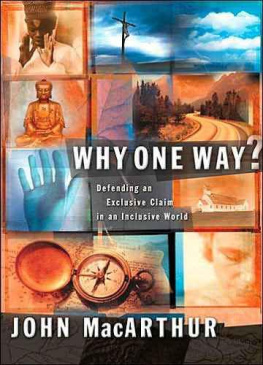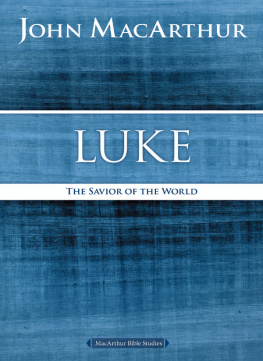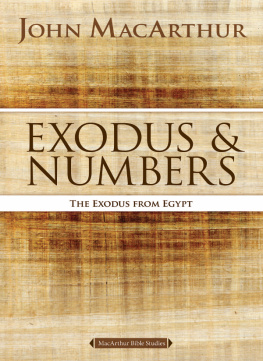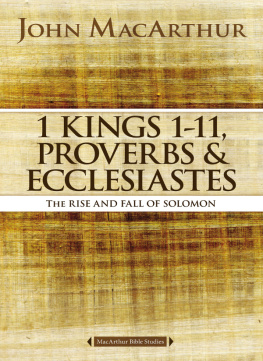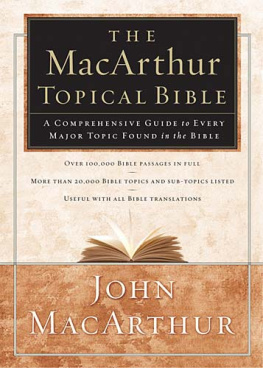Why
One Way?
Defending an Exlusive Claim
in an Inclusive World
BY
JOHN MACARTHUR
www.publishinggroup.com
A Division of Thomas Nelson, Inc.
www.ThomasNelson.com
why one way?
Defending an Exlusive Claim in an Inclusive World
Copyright 2002 by John MacArthur. All rights reserved.
No portion of this book may be reproduced in any form without the written permission of the copyright owner, except for brief excerpts quoted in critidal reviews.
Published by W Publishing Group, a Division of Thomas Nelson, Inc., P.O. Box 141000, Nashville, TN 37216
All Scripture quotations in this book, except those noted otherwise, are from the New King James Version, 1984 by Thomas Nelson, Inc.
Quotations marked nasb are from the New American Standard Bible, 1960, 1962, 1963, 1971, 1972, 1973, 1975, 1977, 1988, and 1995 by The Lockman Foundation, and are used by permission.
Quotations marked kjv are from the King James Version of the Bible.
Contents
Do not marvel, my brethren, if the world hates you.
1 JOHN 3:13
Chapter One: The Church vs. The World
Chapter Two: Objectivity
Chapter Three: Rationality
Chapter Four: Veracity
Chapter Five: Authority
Chapter Six: Incompatibility
Chapter Seven: Integrity
Introduction
I n the Jesus Movement of the 1960s and 70s, the One Way signthe index finger held highbecame a popular icon. One Way bumper stickers and lapel pins were everywhere, and the One Way slogan pretty much became the identifying catchphrase of all evangelicalism.
Evangelicalism in those days was an extremely diverse movement. (In some ways it was even more eclectic than it is today). It encompassed everything from Jesus People, who were an integral part of that eras youth culture, to straight-line fundamentalists, who scorned everything contemporary. But all of them had at least one important thing in common: They knew that Jesus Christ is the only way to heaven. One Way seemed an unshakable belief that all evangelicals shared in common.
That is no longer the case. The evangelical movement of today is no longer unified on this issue. Some who call themselves evangelicals are openly insisting that faith alone in Jesus is not the only way to heaven. They are now convinced that people of all faiths will be in heaven. Others are simply cowardly, embarrassed, or hesitant to affirm the exclusivity of the gospel in an era when inclusivity, pluralism, and tolerance are deemed supreme virtues by the secular world. They imagine it would be a tremendous cultural faux pas to declare that Christianity is the truth and all other faiths are wrong. Apparently, the evangelical movements biggest fear today is that we will be seen as out of harmony with the world.
Why has this dramatic shift taken place? Why has evangelicalism abandoned what we once all agreed is absolutely true? I believe it is because church leaders, in their desperate quest to be relevant and fashionable, have actually failed to see where the contemporary world is going and why.
Were not living in the modern world anymore. This is the postmodern world. And postmodernism is just as hostile as modernism to the truth of Christianityperhaps even more so. The philosophical issues are different, but the worlds hostility to the truth of Scripture has not abated one bit.
Now is not the time to make friends with the world. It is certainly no time to capitulate to worldly cries for pluralism and inclusivism. Unless we recover our conviction that Christ is the only way to heaven, the evangelical movement will become increasingly weak and irrelevant.
It is ironic that so many who are downplaying the exclusivity of Christ are doing it because they believe it is a barrier to relevance. Actually, Christianity is not relevant at all if it is merely one of many possible paths to God. The relevance of the gospel has always been its absolute exclusivity, summed up in the truth that Christ alone has atoned for sin and therefore Christ alone can provide reconciliation with God for those who believe only in Him.
The early church preached Christ crucified, knowing that the message was a stumblingblock to the religious Jews and foolishness to the philosophical Greeks (1 Corinthians 1:23). We need to recover that apostolic boldness. We need to remember that sinners are not won by clever public relations or the powers of earthly persuasion, but the gospelan inherently exclusive messageis the power of God unto salvation.
This brief book is meant as a reminder of the gospels distinctiveness. That very narrowness sets Christianity apart from every other worldview. After all, the whole point of Jesus best-known sermon was to declare that the way to destruction is broad and well traveled, while the way of life is so narrow that few find it (Matthew 7:14). Our task as ambassadors of God is to point to that very narrow way. Christ Himself is the one way to God, and to obscure that fact is, in effect, to deny Christ and to disavow the gospel itself.
We must resist the tendency to be absorbed into the fads and fashions of worldly thought. We need to emphasize, not downplay, what makes Christianity unique. And in order to do that effectively, we need to have a better grasp of how worldly thought is threatening sound doctrine in the church. We must be able to point out just where the narrow way diverges from the broad way.
It is to that end that I offer this little book. It is just a brief overview, but my prayer is that it will help set the truth of the gospel in clear contrast to all the wisdom of this world. Let no one deceive himself. If anyone among you seems to be wise in this age, let him become a fool that he may become wise. For the wisdom of this world is foolishness with God (1 Corinthians 3:1819).
Jesus said,
I am the way,
the truth, and
the life.
No one comes to the Father
except through Me.
JOHN ( 14:6 )
Chapter One: The Church vs. The World.
Do not marvel, my brethren, if the world hates you.
1 JOHN 3:13
W hy do evangelicals try so desperately to court the worlds favor? Churches plan their worship services to cater to the unchurched. Christian performers ape every worldly fad in music and entertainment. Preachers are terrified that the offense of the gospel might turn someone against them; so they deliberately omit the parts of the message the world might not like.
Evangelicalism seems to have been hijacked by legions of carnal spin-doctors, who are trying their best to convince the world that the church can be just as inclusive, pluralistic, and broad-minded as the most politically-correct worldling.
The quest for the worlds approval is nothing less than spiritual harlotry. In fact, that is precisely the imagery the apostle James used to describe it. He wrote, Adulterers and adulteresses! Do you not know that friendship with the world is enmity with God? Whoever therefore wants to be a friend of the world makes himself an enemy of God (James 4:4).
There is and always has been a fundamental, irreconcilable incompatibility between the church and the world. Christian thought is out of harmony with all the worlds philosophies. Genuine faith in Christ entails a denial of every worldly value. Biblical truth contradicts all the worlds religions. Christianity itself is therefore antithetical to virtually everything this world admires.
Jesus told His disciples, If the world hates you, you know that it hated Me before it hated you. If you were of the world, the world would love its own. Yet because you are not of the world, but I chose you out of the world, therefore the world hates you (John 15:1819).
Notice that our Lord considered it a given that the world would despise the church. Far from teaching His disciples to try to win the worlds favor by reinventing the gospel to suit worldly preferences, Jesus expressly warned that the quest for worldly accolades is a characteristic of false prophets: Woe to you when all men speak well of you, for so did their fathers to the false prophets (Luke 6:26).
Next page
